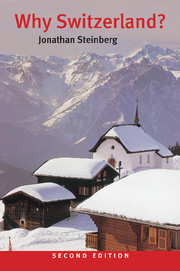Book contents
6 - Religion
Published online by Cambridge University Press: 05 February 2015
Summary
The 1990 census showed that 47.3% of the Swiss population called themselves Protestants and 43.3% Catholic. An additional 6.7% stated that they belonged to no religious community, and the rest were Jews, ‘Old Catholics’ and others. The Swiss take religious division for granted; it is built into the very pattern of their daily life. On the edge of each Swiss town or city there are two signs, one with the place name and the other to identify its religion. Different symbols are used for Protestant and Catholic churches, and the motorist sees at a glance whether both confessions are present in the town or only one. Religious denomination is part of the geography of Swiss identity.
In a world where religious conflict daily destroys once peaceful communities, this peaceful co-existence deserves some attention. As in worldly matters so in religion there is (or has been) a peculiarly Swiss way of doing things. Its most notable achievement has been the construction of a lasting religious peace. That peace in its turn provided a crucial buttress for the modern Swiss state. Equally unusual, though less dramatic, are the institutions which provide the laity of both confessions with the power to participate in the government of their churches. Swiss democracy co-exists, sometimes uneasily, with the authority of pastor and priest.
The outlines of Swiss religious history coincide with general developments in European Christianity. Little distinguished Swiss communities from others in the Upper German region of the Holy Roman Empire in the late fifteenth century.
- Type
- Chapter
- Information
- Why Switzerland? , pp. 206 - 233Publisher: Cambridge University PressPrint publication year: 1996



